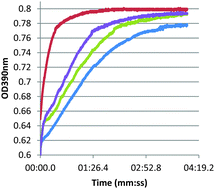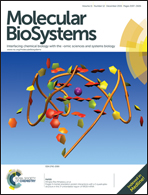Characterisation of SEQ0694 (PrsA/PrtM) of Streptococcus equi as a functional peptidyl-prolyl isomerase affecting multiple secreted protein substrates†
Abstract
Peptidyl-prolyl isomerase (PPIase) lipoproteins have been shown to influence the virulence of a number of Gram-positive bacterial human and animal pathogens, most likely through facilitating the folding of cell envelope and secreted virulence factors. Here, we used a proteomic approach to demonstrate that the Streptococcus equi PPIase SEQ0694 alters the production of multiple secreted proteins, including at least two putative virulence factors (FNE and IdeE2). We demonstrate also that, despite some unusual sequence features, recombinant SEQ0694 and its central parvulin domain are functional PPIases. These data add to our knowledge of the mechanisms by which lipoprotein PPIases contribute to the virulence of streptococcal pathogens.


 Please wait while we load your content...
Please wait while we load your content...